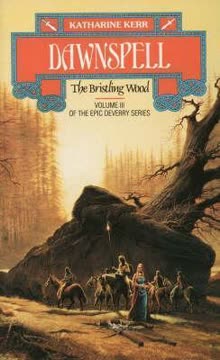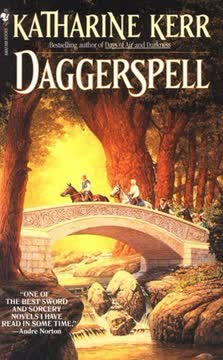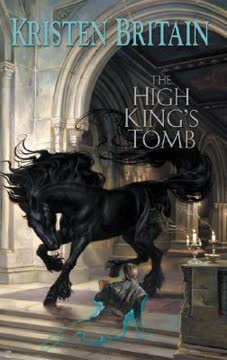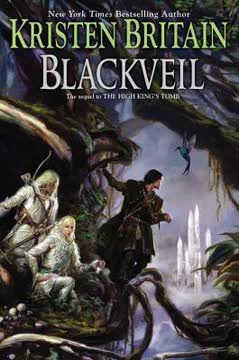Plot Summary
Shadows of Lost Kingdoms
The story opens with the memory of the elven People's lost western kingdoms, destroyed by invading Hordes, and the trauma that still haunts their descendants. Ebañy/Salamander, a half-elven bard, prepares to leave his people's lands, carrying a mysterious ring meant for his unknown brother, Rhodry. The past's violence and displacement echo in the present, as the People's rituals of remembrance intertwine with omens and secrets. The narrative's foundation is laid: the wounds of history, the mingling of races, and the enigmatic power of dweomer (magic) that shapes destinies. The sense of loss, longing, and the search for belonging permeate the world, setting the emotional tone for the saga to come.
Brothers and Bloodlines
Ebañy/Salamander's journey to deliver the ring to Rhodry is mirrored by Rhodry's own struggles with exile and identity. Rhodry, marked as a silver dagger (a mercenary outcast), is haunted by his noble blood and the enmity of his brother, Rhys. Meanwhile, political intrigue brews in Eldidd, as the birth of a new heir threatens to plunge the kingdom into civil war. The complex web of family, legitimacy, and succession is revealed, with secrets of parentage and the burden of bloodlines driving characters toward conflict and self-discovery. The chapter explores the pain of divided loyalties and the longing for reconciliation.
The Silver Dagger's Road
Rhodry's life as a silver dagger is one of hardship and dishonor, yet also of unexpected camaraderie and resilience. He wanders the land, seeking purpose and a place to belong, while haunted by the stigma of his exile. Alongside him, other outcasts—like Maddyn, a bard and former warrior—struggle to find meaning after the collapse of their old lives. The road is both literal and metaphorical: a journey through danger, poverty, and the testing of character. The bonds formed among the dispossessed become a lifeline, even as the threat of betrayal and violence looms.
Spirits in the Stone
Maddyn, wounded and near death, is rescued by Nevyn, a mysterious herbman and dweomermaster, who shelters him in the ancient, spirit-haunted hill of Brin Toraedic. Here, the boundaries between the living and the Wildfolk (elemental spirits) blur, and Maddyn's bardic gifts awaken a deeper connection to the unseen world. The chapter explores the coexistence of mundane hardship and magical wonder, as Maddyn learns to navigate both. Nevyn's enigmatic wisdom hints at larger designs, and the presence of the Wildfolk foreshadows the role of dweomer in shaping the fate of kingdoms.
Winter's Bargain
As winter closes in, Maddyn finds solace and passion with Belyan, a widowed farmwoman, even as he remains an outlaw. Their brief happiness is shadowed by the knowledge that it cannot last; the demands of honor, the threat of discovery, and the harshness of the world force Maddyn to choose between love and safety. The chapter delves into the bittersweet nature of human connection, the sacrifices made for fleeting joy, and the inevitability of parting. The birth of a child offers hope, but also underscores the cycle of loss and renewal.
The Wildfolk's Song
Maddyn's growing rapport with the Wildfolk deepens his understanding of dweomer and the interconnectedness of all things. His music becomes a bridge between worlds, enchanting both spirits and men. The Wildfolk, capricious and childlike, reveal the dangers and delights of magic, as well as its moral ambiguities. Through Maddyn's eyes, the narrative explores the power of art to heal, to summon wonder, and to shape destiny. The presence of the Wildfolk also serves as a reminder of the ancient forces at play beneath the surface of human affairs.
Outlaws and Exiles
Maddyn and Aethan, both outcasts, join Caradoc's mercenary troop, a band of silver daggers forged from the broken remnants of noble warbands. Together, they navigate the brutal realities of war, loyalty, and survival on the fringes of society. The troop's creation of the silver daggers as a symbol of their new identity marks a turning point: from shame to pride, from isolation to brotherhood. Yet the cost is high, as battles claim lives and the hope of redemption remains elusive. The chapter examines the tension between personal honor and collective necessity.
The Making of a King
Nevyn, driven by visions and the burden of past vows, orchestrates a long game to bring peace to the war-torn kingdom by creating a "dweomer king." Through alliances with priests, bards, and other dweomerfolk, he seeks out omens and bloodlines, eventually identifying young Prince Maryn of Pyrdon as the prophesied ruler. The narrative shifts between political intrigue, magical manipulation, and the ethical dilemmas of using power for the greater good. The chapter explores the interplay of fate and free will, the responsibilities of leadership, and the dangers of ambition.
Webs of Dweomer
As Nevyn and his allies lay the groundwork for Maryn's rise, the forces of dark dweomer move in opposition, seeking to sow chaos and thwart the coming peace. The narrative weaves together threads of prophecy, reincarnation, and the unseen battles waged on the astral and etheric planes. Characters grapple with the limits of their knowledge, the temptations of power, and the consequences of meddling in the lives of others. The chapter highlights the complexity of magic as both a tool and a trap, and the necessity of humility in the face of the unknown.
The Price of Honor
Personal and political conflicts come to a head as Rhodry's exile threatens the stability of Eldidd. The birth of a new heir, the machinations of rival lords, and the stubbornness of Rhys, Rhodry's brother, set the stage for potential civil war. Characters are forced to choose between duty and desire, tradition and change, vengeance and forgiveness. The chapter examines the destructive power of pride, the pain of estrangement, and the possibility of reconciliation. The recall of Rhodry becomes both a personal and a national turning point.
The Gathering Storm
As the various factions maneuver for advantage, old wounds are reopened and new alliances are forged. The silver daggers, now a formidable force, are drawn into the service of Prince Maryn, whose destiny as king becomes increasingly clear. Yet enemies abound, both mortal and magical, and the threat of open conflict looms. The chapter builds tension through shifting perspectives, highlighting the fragility of peace and the ever-present danger of betrayal. The storm gathers, both on the battlefield and in the hearts of the characters.
The Wolves of War
War erupts across the land, with the silver daggers at the forefront of the fighting. Maddyn, Caradoc, and their comrades face death, loss, and the testing of their bonds. The brutality of battle is juxtaposed with moments of heroism, loyalty, and unexpected grace. The chapter explores the transformation of individuals and groups under the pressure of war, the creation of myth from suffering, and the enduring power of hope. The wolves of war devour the weak, but also give birth to new strength.
The King's Recall
With the death of Rhys and the intervention of the king, Rhodry is recalled from exile and named heir to Aberwyn. The news brings both relief and sorrow, as the cost of reconciliation is measured in lives lost and wounds that may never fully heal. Lovyan, Rhodry's mother, emerges as a figure of strength and wisdom, guiding the transition with dignity. The chapter reflects on the cyclical nature of history, the possibility of healing, and the enduring need for leadership rooted in compassion.
Betrayal and Bewitchment
Jill, Rhodry's beloved, is ensorceled by Perryn, a wounded soul whose uncontrolled dweomer binds her will and memory. Their journey through the wilds is a nightmare of lost agency and violated trust, culminating in Jill's rescue by Salamander, Rhodry's elven brother. The chapter delves into the psychological and magical dynamics of abuse, the struggle to reclaim selfhood, and the complexities of forgiveness. The consequences of unchecked power are laid bare, and the need for healing—both personal and collective—is underscored.
The Hawks' Prey
Rhodry, lured by false information and betrayed by those he thought allies, is captured by the Hawks of the Brotherhood, a Bardekian blood guild. Drugged and stripped of his memory, he is sold into slavery across the sea. The narrative shifts to a tale of captivity, identity, and the fight to retain one's humanity in the face of dehumanization. Jill and Salamander, racing to rescue him, confront the limits of their power and the dangers of the unknown. The chapter is a meditation on loss, resilience, and the enduring spark of self.
Across the Sea
Jill and Salamander, armed with courage and cunning, follow Rhodry's trail to the pirate haven of Slaith and then across the Southern Sea to Bardek. Their journey is fraught with danger, deception, and the need to navigate both human and magical threats. The chapter explores the challenges of crossing boundaries—geographical, cultural, and metaphysical—and the necessity of adaptation and alliance. The pursuit of Rhodry becomes a quest not only for rescue, but for the restoration of balance and justice.
The Slave's Memory
Rhodry, now called Taliaesyn, struggles to piece together his shattered identity while enduring the indignities of slavery in Bardek. His captors' cruelty is matched by the indifference of the world around him, yet moments of kindness and the presence of the Wildfolk offer glimmers of hope. The chapter is a study in resilience, the power of memory, and the refusal to surrender one's core self. The threads of fate, love, and magic continue to bind him to those who seek him, even across the sea.
Vengeance and Return
As Jill and Salamander close in on Rhodry's captors, the forces of dweomer and destiny converge. The cycle of vengeance is both fulfilled and transcended, as old wounds are confronted and new possibilities emerge. The return of the rightful heir, the healing of broken bonds, and the restoration of order are hard-won, marked by sacrifice and transformation. The chapter closes with a sense of hard-earned hope: the promise that, even in a world scarred by loss and violence, peace and renewal are possible.
Characters
Nevyn
Nevyn is the central figure whose centuries-old vow to right past wrongs drives the narrative. As a master of dweomer, he manipulates events from behind the scenes, orchestrating the rise of a true king to heal the fractured land. His relationships are complex: mentor to Maddyn and Jill, secret guardian of Rhodry, and haunted by his love for Brangwen (reincarnated as Jill and Branoic). Psychologically, Nevyn is marked by guilt, patience, and a relentless sense of duty, often sacrificing personal happiness for the greater good. His development is a journey from prideful meddler to wise, if weary, servant of fate, always wrestling with the limits and ethics of power.
Rhodry Maelwaedd
Rhodry is a man caught between worlds: noble by birth, outcast by decree, and marked by both human and elven blood. His journey from shame to self-acceptance is fraught with hardship, betrayal, and the testing of every bond he holds dear. His relationship with his brother Rhys is defined by rivalry and pain, while his love for Jill is both his anchor and his vulnerability. Psychologically, Rhodry is driven by a longing for belonging and honor, yet haunted by the fear of never being enough. His development is a gradual reclamation of identity, culminating in his restoration as heir and the forging of a new kind of leadership.
Jill
Jill is a woman shaped by loss, resilience, and the legacy of past lives. As Rhodry's beloved and the daughter of the legendary Cullyn, she is both fiercely independent and deeply loyal. Her ensorcelment by Perryn exposes her vulnerabilities, but also awakens her latent dweomer, making her a force to be reckoned with. Psychologically, Jill grapples with shame, anger, and the struggle to reclaim agency after trauma. Her journey is one of healing, self-discovery, and the forging of a new path as both lover and avenger.
Maddyn
Maddyn is a former warrior turned bard, whose music and sensitivity make him both an observer and a participant in the unfolding drama. His relationships—with Nevyn, Belyan, and the Wildfolk—highlight his role as a mediator between the mundane and the magical. Psychologically, Maddyn is marked by grief, longing, and a search for meaning after loss. His development is a testament to the power of art, empathy, and the willingness to embrace both joy and sorrow.
Caradoc
Caradoc is the pragmatic, battle-hardened leader of the silver daggers, a man who forges a new identity from the ashes of defeat. His relationship with Maddyn and Aethan is one of mutual respect and shared hardship, while his mentorship of Owaen and others reveals a hidden capacity for care. Psychologically, Caradoc is defined by cynicism, loyalty, and a deep-seated need to protect his found family. His development is a journey from self-loathing to a hard-won sense of purpose.
Ebañy/Salamander
Ebañy, also known as Salamander, is a half-elven bard whose quest to deliver a ring to his brother Rhodry becomes a journey of self-discovery and reconciliation. His relationships—with his father, the elven People, and Jill—highlight his role as a bridge between cultures and worlds. Psychologically, Ebañy is marked by curiosity, playfulness, and a longing for connection. His development is a movement from outsider to integral player in the fate of kingdoms.
Lovyan
Lovyan is the formidable mother of Rhodry and Rhys, a woman whose wisdom, patience, and strength hold the Maelwaedd clan together through crisis. Her relationships—with her sons, Nevyn, and the wider political world—are defined by both love and pragmatism. Psychologically, Lovyan is marked by grief, resilience, and a capacity for both forgiveness and steel. Her development is a model of leadership rooted in compassion and clarity.
Perryn
Perryn is a tragic figure whose uncontrolled dweomer makes him both victim and perpetrator. His relationship with Jill is a study in manipulation, longing, and the destructive power of unhealed wounds. Psychologically, Perryn is marked by loneliness, self-loathing, and a desperate need for love that turns toxic. His development is a cautionary tale about the dangers of unchecked power and the necessity of self-awareness.
Jill's Gray Gnome (Wildfolk)
The gray gnome is an elemental spirit who serves as Jill's protector, guide, and sometimes judge. Its relationship with Jill is one of fierce loyalty, but also of clear boundaries: it intervenes when she is in danger, but also expresses disapproval when she strays. Psychologically, the gnome represents the voice of conscience, the wisdom of the natural world, and the limits of human understanding. Its development mirrors Jill's own journey toward self-mastery.
Briddyn (Hawk of the Brotherhood)
Briddyn is the face of the Bardekian blood guild, a man whose cruelty, cunning, and amorality make him a formidable antagonist. His relationship with Rhodry is one of captor and victim, but also of twisted fascination. Psychologically, Briddyn is marked by sadism, ambition, and a complete lack of empathy. His development is a study in the corrosive effects of power wielded without conscience.
Plot Devices
Reincarnation and Wyrd
The narrative is structured around the concept of Wyrd (fate) and the reincarnation of souls, with characters' present struggles echoing the unresolved traumas of past lives. This device allows for deep psychological exploration, as characters are haunted by memories, compulsions, and relationships that transcend a single lifetime. The interplay of destiny and free will is a constant tension, with the actions of the past shaping the possibilities of the present. The device also enables the author to weave together multiple timelines, perspectives, and emotional arcs, creating a rich tapestry of interconnected stories.
Dweomer (Magic) as Moral Force
Dweomer is not merely a tool for spectacle, but a force that reflects the character and choices of its wielders. The narrative distinguishes between the dweomer of light (used for healing, guidance, and the greater good) and the dweomer of darkness (used for manipulation, vengeance, and personal gain). The consequences of magic are always psychological and ethical as well as physical, with characters forced to confront the costs of their actions. The device serves as both a source of wonder and a crucible for character development.
The Wildfolk
The Wildfolk—capricious, childlike, and powerful—serve as both plot catalysts and symbols of the world's deeper magic. Their interactions with bards, dweomerfolk, and the innocent reveal the permeability of the boundary between seen and unseen, and their presence often foreshadows major events. The Wildfolk also function as a kind of chorus, commenting on human folly and virtue, and occasionally intervening to tip the balance of fate.
Political Intrigue and Succession
The succession crisis in Eldidd, the ambitions of rival lords, and the machinations of dweomerfolk create a web of intrigue that propels the plot. The device of contested inheritance allows for the exploration of themes of legitimacy, loyalty, and the cost of power. The interplay between personal relationships and political necessity is a constant source of tension, with characters forced to choose between love and duty, tradition and change.
Memory, Amnesia, and Identity
Rhodry's captivity and loss of memory in Bardek serve as both a literal and metaphorical exploration of identity. The device allows for a meditation on what makes a person who they are: blood, memory, love, or will. The struggle to reclaim selfhood in the face of dehumanization becomes a central arc, mirrored by Jill's own journey through ensorcelment and recovery.
Foreshadowing and Prophecy
The narrative is rich with prophecies, omens, and dreams that both guide and mislead characters. These devices create suspense, deepen the sense of inevitability, and invite readers to look for patterns and connections. The tension between what is foretold and what is chosen is a recurring theme, with characters often struggling to interpret or resist the dictates of fate.
Analysis
Katharine Kerr's The Bristling Wood is a masterful tapestry of Celtic-inspired fantasy, blending political intrigue, reincarnation, and the moral complexities of magic into a deeply human story. At its heart, the novel interrogates the nature of destiny: are we bound by the wounds and choices of our past lives, or can we forge new paths through courage, love, and self-awareness? The narrative's structure—shifting between timelines, perspectives, and planes of existence—mirrors the tangled web of Wyrd that ensnares its characters. Kerr's use of magic is particularly notable: dweomer is not a deus ex machina, but a force that tests the soul, demanding humility, restraint, and ethical clarity. The novel's emotional core lies in its exploration of trauma and healing: from the elven People's ancient loss to the personal violations suffered by Jill and Rhodry, the story insists that true peace can only be won through the hard work of reconciliation, both with others and with oneself. The lessons are clear: power without compassion is destructive; honor must be tempered by mercy; and the bonds of love—whether forged by blood, choice, or fate—are the only sure guides through a world bristling with danger and possibility.
Last updated:
Review Summary
The Bristling Wood receives mostly positive reviews, with readers praising the world-building, character development, and complex plot. Many enjoy the reincarnation aspect and Celtic-inspired setting. Some criticize the handling of gender issues and rape storylines. Readers appreciate the political intrigue and magical elements but note the book ends on a cliffhanger. Several mention it's best to start from the beginning of the series. Overall, fans find it an engaging continuation of the Deverry saga.








